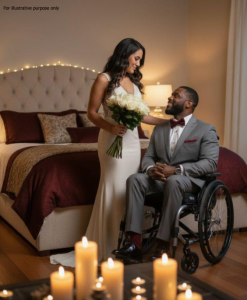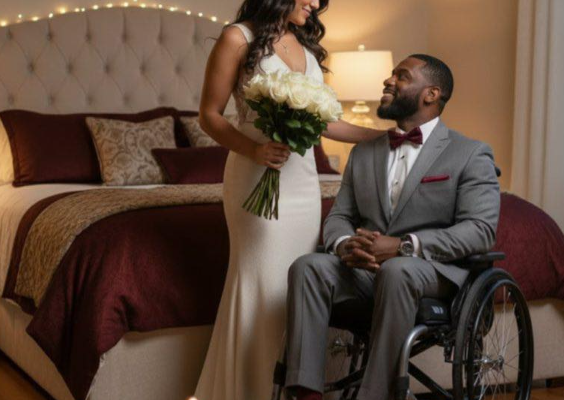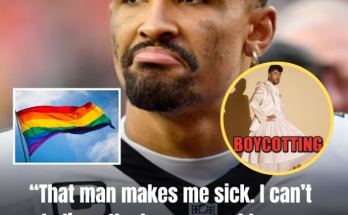
The Wedding of Second Chances
At forty, I had stopped believing in miracles. My friends had long since built families, my career had plateaued, and the house I lived in felt more like a museum of unfulfilled plans than a home. So when Daniel entered my life — calm, patient, gentle, and walking with a cane — I told myself that love was overrated. Companionship, at least, was still possible.
We met through a community outreach project. He had lost partial use of his leg in an accident years earlier and volunteered to help others with mobility challenges. I was drawn not by attraction, but by his stillness — a kind of quiet resilience that made me feel safe. When he proposed six months later, I said yes, not from passion, but from a longing for stability.
Our wedding was modest — a handful of friends, soft music, and laughter that felt rehearsed. Everyone called me lucky to have found “such a kind man.” I smiled and nodded, hiding the storm inside. There was no spark, no racing heartbeat, just gratitude wrapped in hesitation.
That night, as we entered the small cottage we’d rented by the sea, the silence between us felt heavier than the waves outside. The air smelled of salt and roses — both soothing and sharp. Daniel turned to me, his eyes searching mine with gentleness I couldn’t return.
“You’re nervous,” he said quietly.
I nodded. “It’s just… it’s been a long day.”
He smiled and touched my hand. “You don’t owe me anything tonight. Rest if you want.”
His kindness disarmed me. In truth, I’d been dreading that moment — the intimacy I wasn’t sure I could give. I turned away, pretending to tidy the bedside table, but something in his tone stopped me. It wasn’t pity or expectation — it was understanding.
When I finally sat beside him, I couldn’t help but notice his leg — the one he always kept covered, even in summer. His gait had always been steady but guarded. I had never asked too many questions, respecting what I assumed were old scars best left alone.
That night, as moonlight filtered through the curtains, I whispered, “Does it hurt? Your leg, I mean.”
He looked down, a faint smile flickering on his lips. “Not in the way people think. It used to. Not anymore.”
Curiosity overpowered fear. “Can I see it?”
He hesitated for a heartbeat, then nodded. “If you want to.”
When he lifted the blanket, I held my breath. I had expected something frightening — scars, metal, perhaps an emptiness where a limb should be. Instead, I saw strength. His leg wasn’t gone at all. The skin was marked, yes, but beneath the faint pattern of healed surgery lines, there was muscle, vitality, and grace.
He noticed my confusion and said softly, “They told me I’d never walk again. I spent two years proving them wrong.”
The shock wasn’t the leg itself — it was the realization that I’d built an entire wall between us based on an assumption. I had seen him as damaged when he was anything but. The cane, the limp, the quietness — all symbols I’d interpreted as weakness — were evidence of endurance.
I felt small in that moment, but also deeply moved. “Why didn’t you tell me?” I whispered.
“I did,” he said. “You just never asked what kind of disability it was.”
His words weren’t cruel. They were true.
I had said yes to marriage without knowing the full story of the man beside me. I’d been so busy preparing for disappointment that I hadn’t opened myself to discovery. The real shock under that blanket wasn’t physical — it was spiritual.
Daniel reached for my hand. “You don’t have to pretend to love me,” he said gently. “Love can come later. What matters is honesty.”
Tears burned my eyes. “I’m not sure I know how to love anymore.”
“Then start with kindness,” he said. “Toward yourself first.”
We sat there for a long time, listening to the sea crash against the rocks. The night didn’t unfold like a romance novel — there was no sudden passion, no cinematic embrace. Instead, there was stillness, truth, and an unexpected peace that neither of us had known we needed.
In the days that followed, I began to see him differently. The way he poured coffee carefully, as if every drop mattered. The way he paused before speaking, never rushing to fill silence. He carried his life like someone who had once faced the possibility of losing it — and had learned to treat every ordinary moment as a gift.
One morning, while walking along the beach, I asked him what the accident had taught him.
He thought for a while before answering. “That strength isn’t the absence of pain. It’s choosing to move through it anyway.”
That sentence became the quiet thread that stitched our lives together. We didn’t fall in love overnight. It happened in fragments — laughter over burnt toast, long talks under blankets, the first time I caught myself missing him when he wasn’t there.
I realized I had married a man I didn’t love to escape loneliness — and ended up discovering the purest form of companionship. The kind built not on attraction or fantasy, but on shared humanity.
Years later, when people asked about our marriage, I never mentioned the age difference or the limp. I told them the truth: that love can arrive in unexpected forms, sometimes disguised as friendship, patience, or even obligation — and that real love begins the moment you stop judging how it should look.
Looking back, that wedding night wasn’t about shock. It was about revelation. I thought I was lifting a blanket to see a wound — but what I uncovered was strength, humility, and the quiet miracle of resilience.
At forty, I thought my story was over. In truth, it was just beginning.

